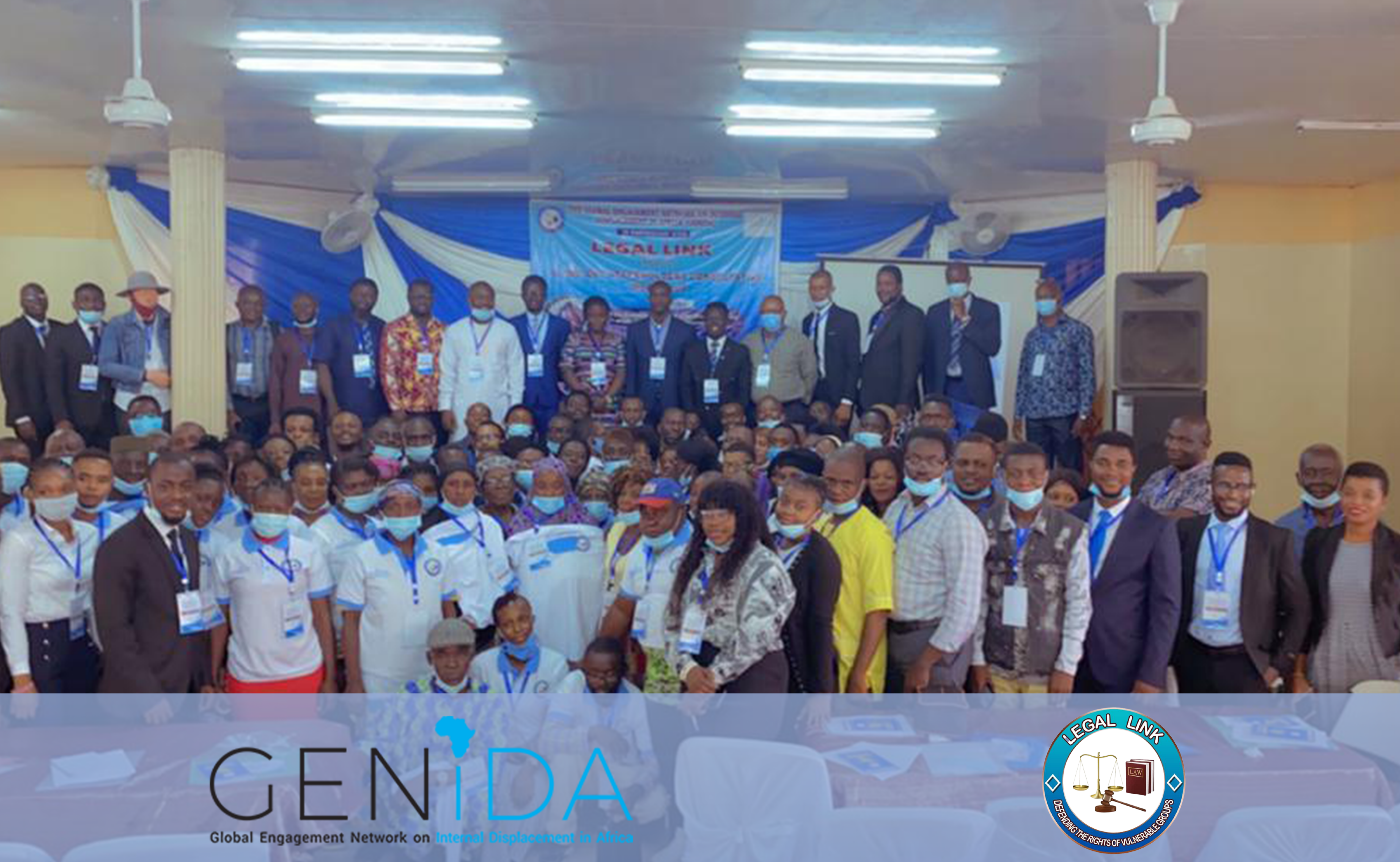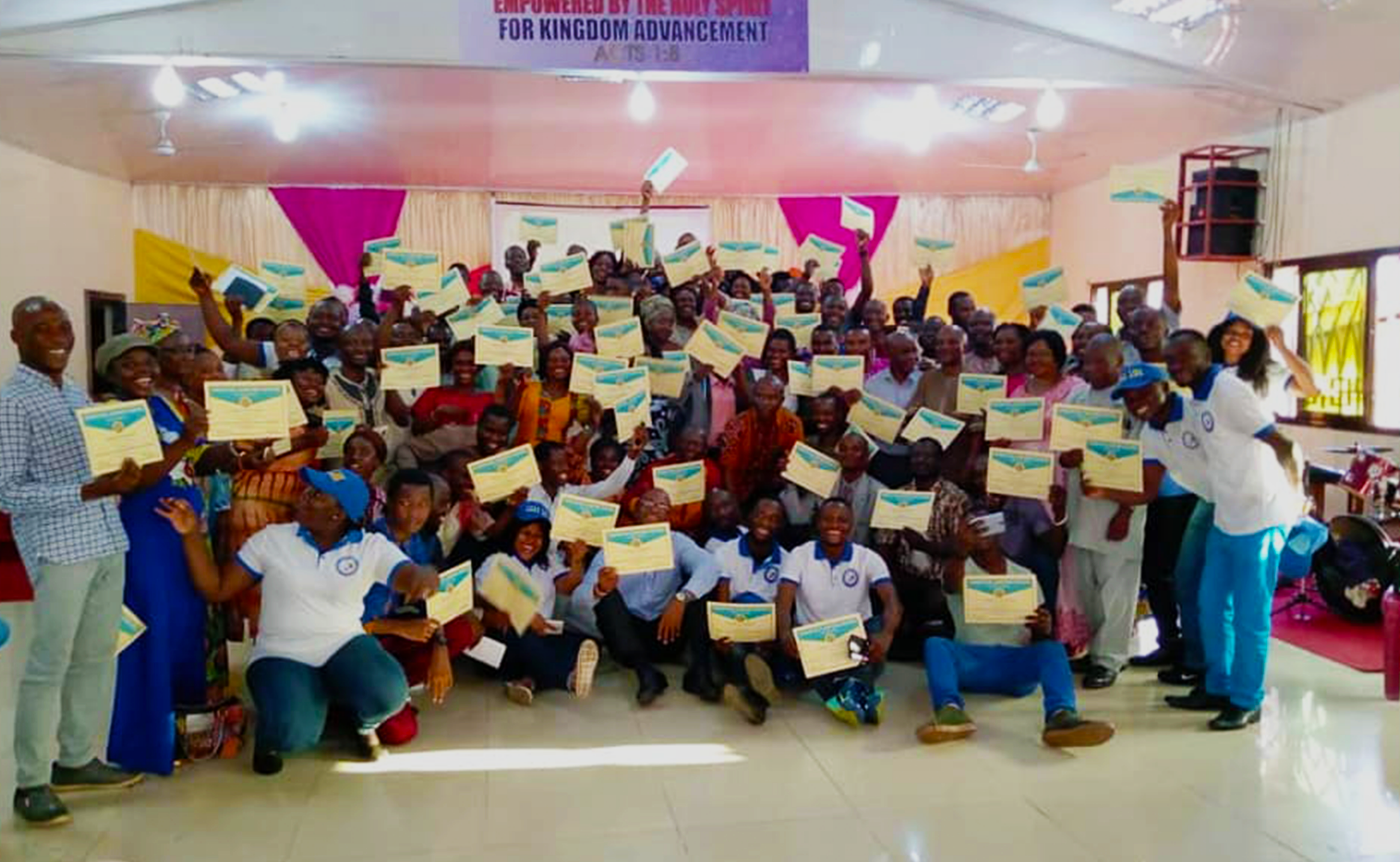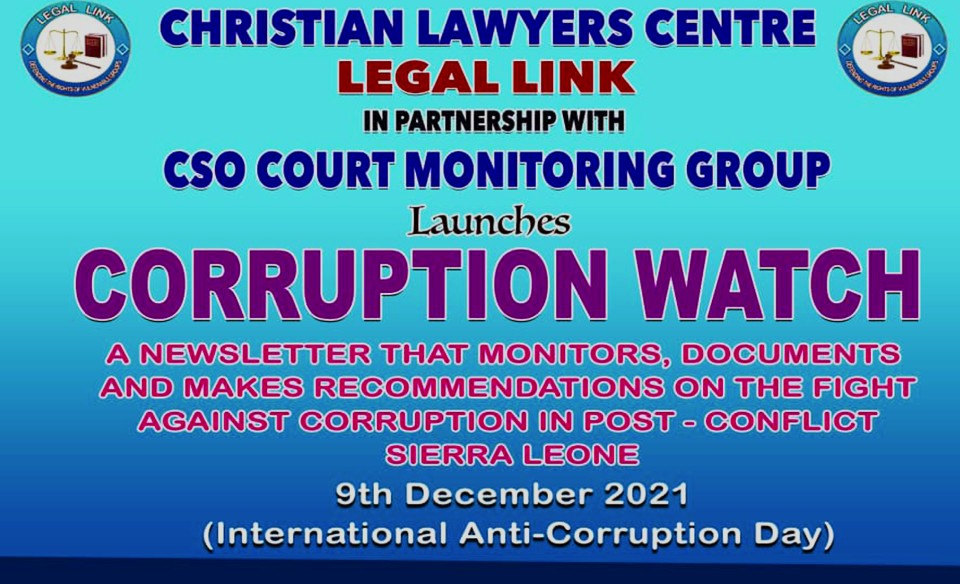
PRELIMINARY FINDINGS
THE CSO COURT MONITORING GROUP IN COLLABORATION WITH LEGAL LINK CONGRATULATES THE ACC OVER ITS SUSTAINED PROGRESS IN THE MCC CONTROL OF CORRUPTION SCORE CARD BUT CALLS ON THE INSTITUTION AND THE SPECIAL COURT ON CORRUPTION TO ADDRESS THE ISSUES OF SELECTIVE JUSTICE AND PROLONGED TRIALS RESPECTIVELY
As the world celebrates the International Anti-Corruption Day, LEGAL LINK together with the CSO COURT MONITORING GROUP, in commemoration of the day, has agreed to release the preliminary findings of its monitoring of the ACC and the Special Court on Corruption in their fight against corruption in post conflict Sierra Leone.
Introduction It could be recalled that on 31st October 2003, the General Assembly adopted the United Nations Convention against Corruption through resolution 58/4. The Assembly also designated 9th December as International Anti-Corruption Day, to raise awareness of corruption and of the role of the Convention in combating and preventing it. The celebration of the 2021 International Anti-Corruption Day seeks to highlight the rights and responsibilities of everyone - including States, Government officials, civil servants, law enforcement officers, media representatives, the private sector, civil society, academia, the public and youth - in tackling corruption. Preliminary findings of the CSO Court monitoring group reveal that in the last four years, the Anti-Corruption Commission has scored high in almost all global, regional and domestic anti-corruption rankings. To start with, the ACC has passed the MCC control of corruption indicator for the fourth consecutive year. Similarly, Sierra Leone has moved 13 place upwards in the transparency international corruption perception index 2020.
Furthermore, the global corruption barometer of 2019 ranked Sierra Leone 3rd out of 35 African states surveyed on government effectiveness in the fight against corruption. According to the 2020 Afro barometer report, corruption prevalence declined from 70% in 2015 to 40% in 2020. More positive still, the national perception survey report published in 2020 revealed that 92% of respondents interviewed were convinced that the fight against corruption is on track. Furthermore, while recoveries have remained positive, the ACC has also done well in terms of winning the MCC Compact; a monetary package that is worth hundreds of millions of dollars given to countries by the US government to support socio- economic development. But notwithstanding the above successes however, there is still a great deal of challenges eclipsing the ACC and the Special Court on Corruption in their quest towards eradicating corruption in Sierra Leone.
For example, a major area of concern as espoused by the public during engagement with the CSO COURT MONITORING GROUP is selective justice. Even though the ACC has indicted many people under the New Direction era, much emphasis has however been placed on members of the past government as against those currently serving in office. Little wonder why the former USA Ambassador advised that the ACC starts looking within. In terms of speed in corruption investigations, the Court Monitoring Group notes that investigations of suspects within the government circle have enjoyed relative speed as against past government officials.
For example, the ACC took less than three months to investigate and conclude on allegations of corruption surrounding the Office of the First Lady while investigations are still ongoing with respect to the former president, a case that started much earlier than the former.
Secondly is the mode usually applied in investigating high profile cases by the ACC. The Court Monitoring Group have also noted that the ACC in investigating high profile cases concerning officials in the present government will publicly announce the opening of such investigations to cover periods in which past government officials did serve in such offices.
For example, the ACC while investigating the Office of the First Lady openly declared that it will go as far back to the period covering the former First Lady. The same approach was also adopted by the ACC in its investigations of the Ministry of Foreign Affairs chancery building corruption allegation. While such approach may be convenient, it is important to however emphasize that, for the ACC to openly announce such to the public, prior to commencement of investigations, overtly raises a red flag and may further invite misconceptions from the public as to whether ACC is truly investigating or seeking to provide defense for government suspects undergoing investigations before it. By way of recommendation therefore, it is important going forward for the ACC to allow the evidence to lead them rather than them leading the evidence prematurely.
Thirdly, is ACC’s open conflict with whistleblowers. No doubt, one of the leading and most credible whistle blowers in Sierra Leone is the Africanist Press. Aside the politics, it has uncovered a great deal of corruption within the public sector in Sierra Leone which has led the ACC to even in some instances open up investigations.
For an apparent or seeming conflict to now arise between the ACC and a whistle blower of such nature is not only unfortunate but will certainly disincentivise other whistle blowers from coming to the fore with evidence of corruption.
By way of recommendation, it is important for the ACC to always go for the information and facts irrespective of the place or person it is coming from. Protecting whistleblowers is a duty placed on the ACC by the 2008 corruption legislation and such provisions must be respected going forward.
Furthermore, is the appointment of both the ACC commissioner and deputy commissioner by the president. This provision as enshrined under the 2008 legislation has been the most challenging in the area of actualizing full independence of the Commission in terms of control and resisting manipulations from the Executive branch of the state.
The Court Monitoring Group recommends that the appointment of the ACC Commissioner is subject to a call for application process advertised by the Advisory Board on corruption and subject to parliamentary approval. The president’s involvement in the recruitment process of the ACC Commissioner must be reduced to the lowest ebb.
As regards the Deputy ACC Commissioner, his recruitment must be subject to a call for application process and approved by the ACC Commissioner so as to prevent insubordination and political backstabbing within the operations of the Commission.
Finally, is the problem of prolonged trials and poor turnover rate by the Special Court on Corruption.
No doubt, the intent of setting up the court on corruption as espoused by the Chief Justice during the open ceremony in December 2019 was primarily to expedite corruption cases and increase turnover rate.
A cursory look at the preliminary findings of the CSO COURT monitoring group revealed that not much has been done in terms of expeditious trials and turnover rate.
For example, in the case of the State v Stephen Mansaray and three others (2019) charged with conspiracy and misappropriation of public funds, the litigation has lasted for a year and half with no judgment to be delivered; and has been further adjourned for about forty six times.
In similar vein, the case of the State v Sarah Finda Bendu, Victor Labour and Kepiatu Alghelli, lasted two years before a judgment could be delivered for one of the accused persons whereas the other accused persons are still undergoing trial.
In 2020 alone, a total of 37 cases were assigned to the ACC Court and only 15 cases were completed out of the 37 cases leaving out 22 cases pending; and in 2021, a total of 9 cases were assigned to the said Court and only four cases were completed leaving out five cases with no judgment yet.
From the above statistics, it is apparent that the court is still challenged in the area of dispensing cases speedily with improved turnover rate.
Conclusion As the world celebrates the international anti-corruption day on 9th December, 2021, the Court Monitoring Groups despite the challenges commends the government, the ACC and it's staff, the special court of corruption and its judges and the people of Sierra Leone for their strides in making corruption unfashionable in the country.
LONG LIVE THE PEOPLE OF SIERRA LEONE!
LIVE THE FIGHT AGAINST CORRUPTION!!
Sign:
Rashid Dumbuya Esq. Team Lead, CSO Court Monitoring Group.
On behalf of the CSO COURT MONITORING GROUP.
ABOUT THE CSO COURT MONITORING GROUP
The CSO COURT MONITORING GROUP is a consortium of independent civil society organizations engaged in the monitoring of the Anti- Corruption Commission and the Special Court on Corruption to ensuring that both institutions uphold the rule of law, fair trail rights and respect the human rights of suspects and accused persons in their fight against corruption in post conflict Sierra Leone.Category
Recent Posts
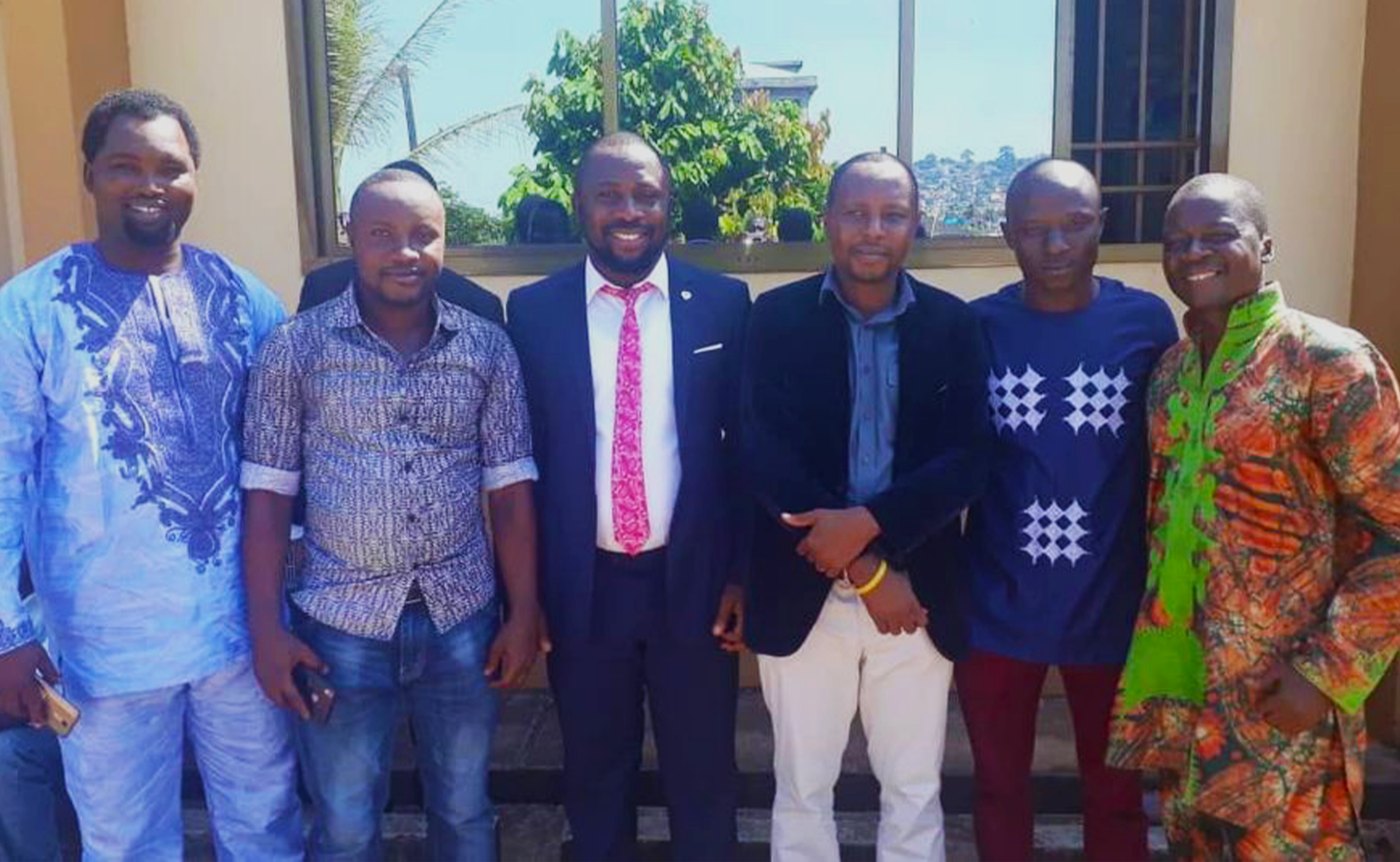
Tags
Similar Posts
 Media Update
Media Update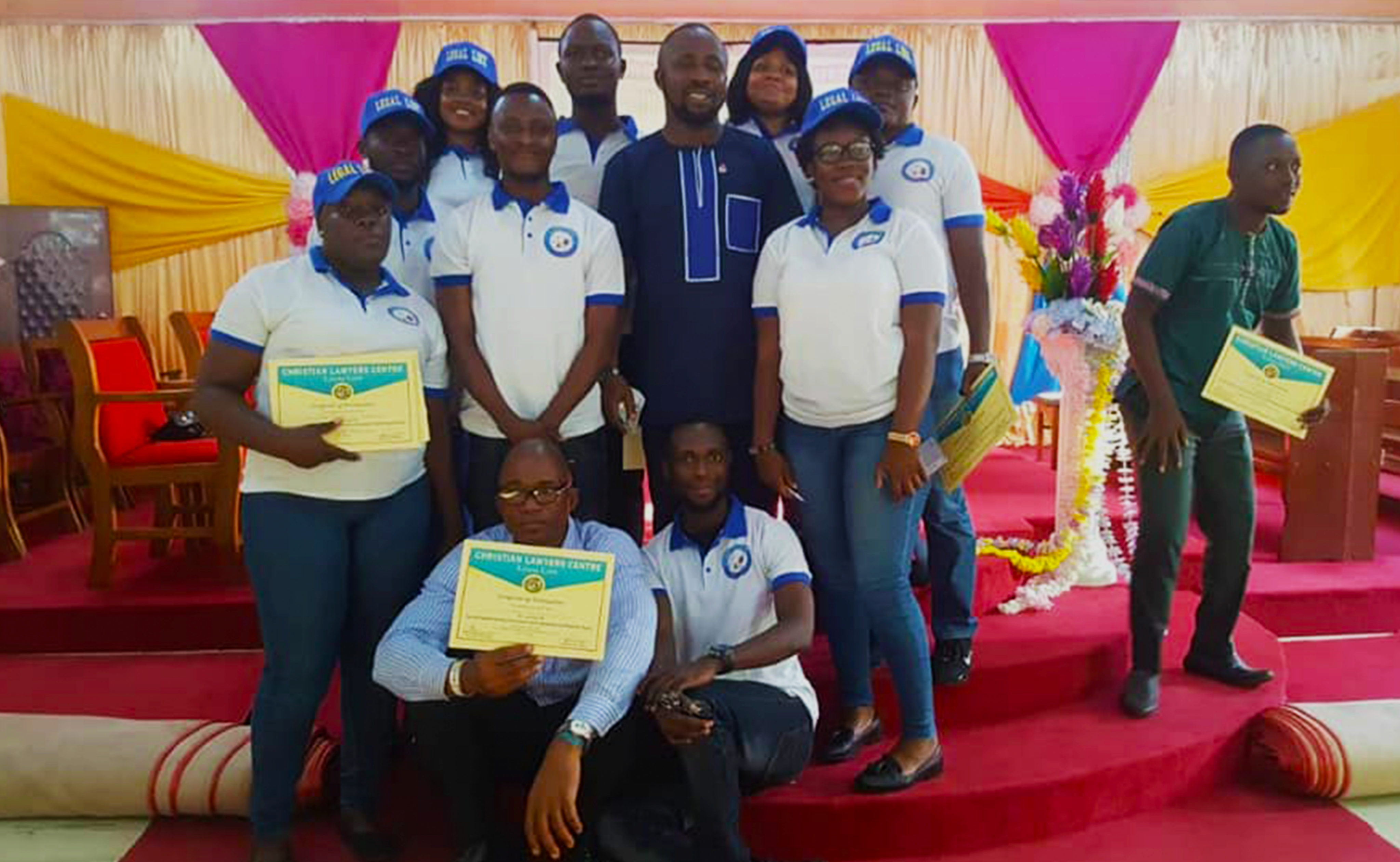 Media Update
Media Update

